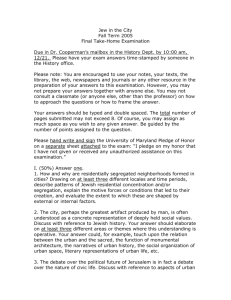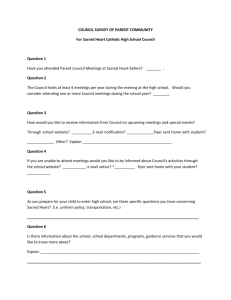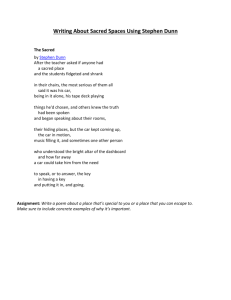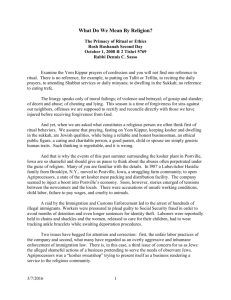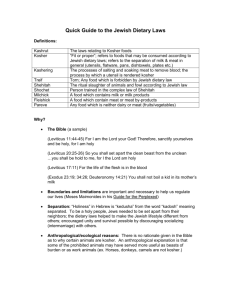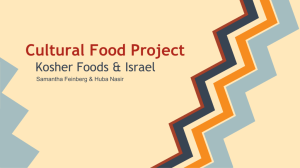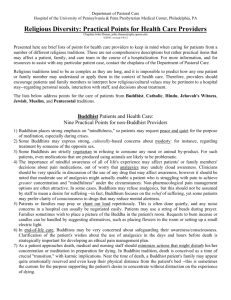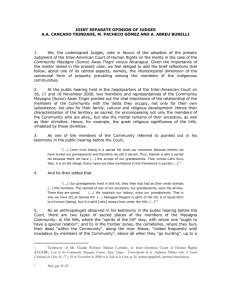Contribution of Religion to Individuals
advertisement
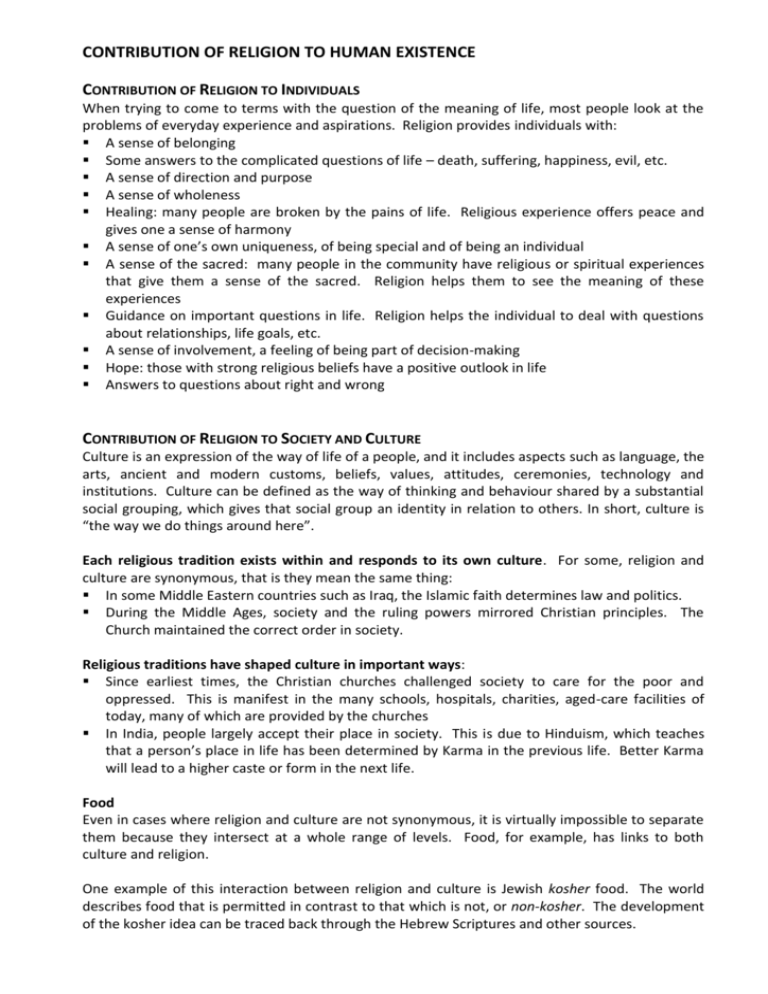
CONTRIBUTION OF RELIGION TO HUMAN EXISTENCE CONTRIBUTION OF RELIGION TO INDIVIDUALS When trying to come to terms with the question of the meaning of life, most people look at the problems of everyday experience and aspirations. Religion provides individuals with: A sense of belonging Some answers to the complicated questions of life – death, suffering, happiness, evil, etc. A sense of direction and purpose A sense of wholeness Healing: many people are broken by the pains of life. Religious experience offers peace and gives one a sense of harmony A sense of one’s own uniqueness, of being special and of being an individual A sense of the sacred: many people in the community have religious or spiritual experiences that give them a sense of the sacred. Religion helps them to see the meaning of these experiences Guidance on important questions in life. Religion helps the individual to deal with questions about relationships, life goals, etc. A sense of involvement, a feeling of being part of decision-making Hope: those with strong religious beliefs have a positive outlook in life Answers to questions about right and wrong CONTRIBUTION OF RELIGION TO SOCIETY AND CULTURE Culture is an expression of the way of life of a people, and it includes aspects such as language, the arts, ancient and modern customs, beliefs, values, attitudes, ceremonies, technology and institutions. Culture can be defined as the way of thinking and behaviour shared by a substantial social grouping, which gives that social group an identity in relation to others. In short, culture is “the way we do things around here”. Each religious tradition exists within and responds to its own culture. For some, religion and culture are synonymous, that is they mean the same thing: In some Middle Eastern countries such as Iraq, the Islamic faith determines law and politics. During the Middle Ages, society and the ruling powers mirrored Christian principles. The Church maintained the correct order in society. Religious traditions have shaped culture in important ways: Since earliest times, the Christian churches challenged society to care for the poor and oppressed. This is manifest in the many schools, hospitals, charities, aged-care facilities of today, many of which are provided by the churches In India, people largely accept their place in society. This is due to Hinduism, which teaches that a person’s place in life has been determined by Karma in the previous life. Better Karma will lead to a higher caste or form in the next life. Food Even in cases where religion and culture are not synonymous, it is virtually impossible to separate them because they intersect at a whole range of levels. Food, for example, has links to both culture and religion. One example of this interaction between religion and culture is Jewish kosher food. The world describes food that is permitted in contrast to that which is not, or non-kosher. The development of the kosher idea can be traced back through the Hebrew Scriptures and other sources. Food is part of any culture. All people need it to survive. For the Israelites and other biblical cultures, bread was the staple food. Important grains were barley and wheat. Other important foods apart from bread were fruit, vegetables, dairy products and, on special occasions, meat. At a certain stage of Israelite history, guidelines were developed concerning the draining of blood from animals. Soon after this, certain animals came to be understood as ritually unclean and therefore not to be consumed (eg the meat of pigs). These guidelines were recorded as laws in the Hebrew Scriptures. Scholars believe that kosher laws were initially developed to control the consumption of agricultural produce. As time went on however, rules were developed to regulate the consumption of meat and milk, the types of animals, birds and fish that could be eaten and the way in which these foods should be prepared for consumption. Later on in Jewish tradition, kosher came to refer to objects that were ritually correct and faultless, to the Torah scrolls themselves and, more recently, to that which is proper within Jewish law. Therefore, religion has both personal and social value. On the personal level: It helps an individual find a place in the larger area of society and the cosmos It offers a framework of meaning and coherence that gives direction to people’s lives It provides strength and support in times of adversity, transition and celebration It is a source of values and ideas that make life meaningful. On the social level: It functions as a source of cultural cohesion It functions as a source of cultural transformation These roles appear contradictory, but they help to explain why rulers and governments have sought either to control or to suppress the religious beliefs and institutions of a people. RELIGION AS SOURCE OF CULTURAL COHESION Support and Hope Religions tend to be socially conservative and sociologists have long recognised the role of religion in maintaining and reinforcing cultural aspects such as social structures, norms and values. This conservative role is particularly important when people experience injustice, poverty, powerlessness, scarcity and death. At such times, religion offers emotional support by providing a view of a blessed future that is independent of the present. It helps people become resigned to situations of poverty or oppression by offering hope in a future when they will experience joy and fulfilment. The hope of a future heaven where people will enjoy all the blessings currently denied them can be very comforting to those who have a miserable existence, but it does not necessarily help people address the limitations of the present, nor does it necessarily provide them with the desire to change society for the betterment of all. Religious doctrines, rituals and values make a positive social contribution by offering people a variety of supports in the trials of life. However, religion can function as a form of social control when it endorses the value of social order over the legitimate concerns of individuals and groups. Communal Identity In times of rapid social change, religion offers people a sense of communal identity as they struggle with questions of personal meaning and life direction. Membership in a group can be particularly consoling when people feel alienated from the larger society. The provision of group identity and support is a valuable contribution. But religion can also interfere with the process of spiritual and social maturation by keeping individuals dependent on an authoritarian institution that protects and makes decisions for them. All religious groups need to be attuned to the criticisms both of their members and of those who stand outside their circle. These critical voices challenge the group to evaluate the ways in which it contributes positively and negatively to the larger society. Positively, religion can be a kind of cultural cement that unites people through adherence to common values and beliefs. Negatively, religion can retard personal social development when it fails to understand the ways in which it supports the status quo and makes individuals dependent on unjust authority. RELIGION AS A SOURCE OF CULTURAL TRANSFORMATION The Need to Challenge Society Religion not only helps to maintain the norms, values and structures of society, it can also offer profound criticism of those same norms, values and structures. It can support the established order, but it can also cry out for justice for those marginalized or neglect by the present social order. Religious groups and individuals have, at times, been strongly critical of the social and political order for failure to care for people such as the unemployed, the needy, migrants and religious and ethnic minorities. Religious groups have also challenged society to address issues such as the economic order, freedom of educational choice, ecological issues, the role of the family, the right to life, the place of women in religious practice, and the role of moral values such as peace, justice, tolerance and freedom. Religion is never totally the servant of society, and the sacred texts of the religious traditions offer criticisms of those situations where people are deprived of their rights and where their very humanity is assaulted. Criticism alone will not bring about social change, and the great religious texts also offer a vision of a better way, a way to which their adherents appeal as they work for social change. One example of this process can be seen in various liberation theologies. These use the Exodus story of the Jewish people as an example of the overthrow of oppression and the realisation of a new way of life in a promised land. Theologies that are based on this sacred story believe that God is active in history and that they are empowered to criticise social structures as well as to work for the development of new and more egalitarian societies. The Catholic Church, for example, is at the forefront of social criticism in some South and Central American countries (El Salvador, Argentina, Nicaragua) using liberation theology as its basis as a way of challenging extreme poverty and oppression. DIVERSITY AND CHANGE IN RELIGION Religious traditions can also experience diversity and change through dynamic interaction with their surrounding religious and social cultures. This might come about when new insights emerge, when new groups are formed, or when new interpretations of the tradition are formed by individuals or groups. Yet, it is also true to say that both consolidation and preservation as well as diversity and change, exist side by side, with the one often affecting the other throughout the history of a tradition. A clear example of this the phenomenon of religious dress or garb. Some features of Islamic dress have persisted down through the ages, others have been modified or dispensed with altogether. The same applies to Christian religious ‘habits’ (robes), to Jewish religious dress, and to the costumes and garb in Buddhism and Hinduism. CONCLUSION The questions that confront people over the course of the years will reach their time of ascendancy at different points in the journey, but the very fact of seeking answers reflects the larger human project whereby everyone seeks to understand, make connections, and discover meaning. To live fully is to accept the invitation to reformulate, patiently and consistently, the patters that give coherence and stability to our lives. The Need for Answers There is a biological and developmental sequence to many of the questions that are asked on the journey of life, but there are times when the questions become more significant and the need for answers is urgent. The most fundamental situation is death, but there are many others such as severe illness, breakdown in personal relationships, long-term unemployment, discrimination, oppression, disillusionment with life, injustice and environmental disaster. These experiences can so challenge the way we have come to understand life that we have to think anew about the answers that we have forged. At such moments, past answers are no longer adequate, and we find ourselves at the limit of our capacity to make sense of life. A Matter of Choice These experiences confront us with a choice about HOPE or DESPAIR as the fundamental attitude to life. If one comes to the conclusion that life and the world are without meaning, then they will live with a growing sense of fatalism about a world over which they have no control. Alternatively, such moments challenge a person to trust in a source of meaning that transcends their ability to explain all of the data that confronts them. ****** The questions that are asked naturally as a part of the development and maturation are brought into sharper focus with the limited situations in which we live. People gradually come to realise that life is not simply a ‘given’, but rather that it is given to each person for a purpose: to make something out of it. Life is not ready-made, so each person needs to face possibilities both known and unknown, and make responsible decisions about the way that they will give meaning and coherence to life. The possibilities are not endless because we all live within particular historical, cultural, communal and family situations that function as ‘givens’. These ‘givens’ contribute to who we are and who we may become. They also indicated certain boundaries or restraints on the possibilities that confront us in life. Summary Questions Contribution of Religion to Individuals - List the factors that individuals identify as the contribution of religion to their lives. Contribution of Religion to Society and Culture - Define the term culture. - Identify two examples of where religion has been synonymous with culture. - Identify two examples of where religion has shaped the culture in important ways. - Explain how food has links to both culture and religion giving examples. - Briefly explain how religion has both personal and social value within society. Religion as a Source of Cultural Cohesion - Explain the understanding of religion being “socially conservative”. - Identify the benefits and disadvantages of religion playing a conservative role. - Explain why religion can provide and communal identity and identify the benefits of this role. Religion as a Source of Cultural Transformation - Identify examples of how religious groups have challenged society to address issues of societal change. - Briefly discuss the concept of Liberation theologies. Undertake a case study of an individual for whom religion has been an important contributing factor in their life. This might be an opportunity to study the life of a significant individual within a chosen religious tradition..


